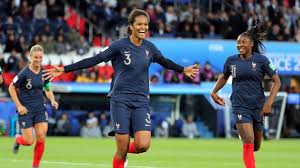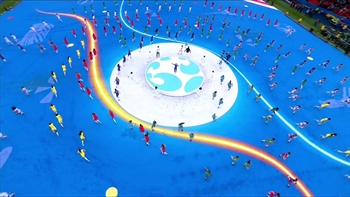By Andrew Warshaw in Paris
June 8 – Emerging from the Parc des Princes metro for the start of the eighth women’s World Cup, supporters could have been forgiven for wondering whether they had picked the wrong game at the wrong time.
One single poster promoted football: France’s Euro 2020 fixture against Albania in September. Nothing about what the fans had actually come to see.
It may have been a small detail but it encapsulated the difference between the mens’ and womens’ World Cups. There just isn’t the ballyhoo and razzmattaz that accompanies the men’s event.
It’s understandable. Women’s elite football may have progressed in leaps and bounds but it is still dwarfed the men when it comes to commercialisation and globalisation.
And, of course, when it comes to prize money. While the €30 million awarded to participating teams over the next four weeks is double the amount of 2015, it is still a long way short of the men’s $400 million prize pot (of which the winners, France, took $38 million).
But for all that, this event gets bigger every four years and there was an expectant atmosphere among the 45,000-plus crowd – once, that is, they had actually managed to negotiate the queues to get in.
The colourful 300-strong opening ceremony, in front of a string of VIPs including French president Emanuel Macron sitting next to FIFA president Gianni Infantino, soon got everyone in the mood on a windswept evening that felt distinctly unseasonal.
The predominantly youthful crowd belted out ‘Allez les Blues’ as hosts France and opponents South Korea took the field and after a stirring rendition of La Marseillaise it was time for action.
The way the star-studded French side dominated the early stages suggested something of a walkover against adversaries who started like proverbial rabbits in the headlights.
It was all one-way traffic and predictably only nine minutes were on the clock when Eugenie Le Sommer swept the ball in off the bar from skipper Amandine Henry’s cross for her 11th goal in as many games.
Six groups of four teams will compete for the 16 places in the knockout phase on the road to the final on 7 July in Lyon. France, with seven players from European champions Olympique Lyon in their starting line-up, will have far tougher encounters than this in their quest for glory on home soil to try and emulate what their male counterparts achieved in Russia last year.
It took the nervous Koreans 15 minutes even to get out of their own half and they appeared to fall further behind through Griedge Mbock Bathy’s acrobatic overhead kick, only for VAR to be called into action for the first time in the tournament to rule out the goal for the most marginal of offsides: perhaps half a boot.
It hardly mattered. Ten minutes later, Wendie Renard, described somewhat condescendingly as the Virgil van Dijk of European women’s football but very much the darling of the crowd, powered home a corner to double the lead.

France’s movement, strength and technique was all too much for the Koreans. With virtually the last kick of the half, Renard repeated the act, rising majestically above the Koreans’ battered rearguard for number three in what was France’s 15th attempt on goal.
And that, effectively, was that.
Well, except for the goal of the game, a glorious curled effort from Henry late on that rounded off the 4-0 scoreline, a fitting end to a week in which most of the football headlines in Paris have been all about some of the less savoury politics of the game.
Contact the writer of this story at moc.l1745708993labto1745708993ofdlr1745708993owedi1745708993sni@w1745708993ahsra1745708993w.wer1745708993dna1745708993

